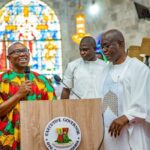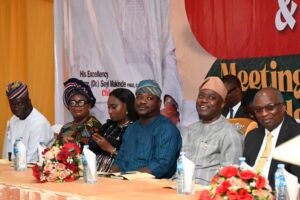
As the world marks World Water Day, on March 22, 2025, Africans and specifically Nigerians are reminded of the stark reality that clean and safe water is a luxury only accessible to the rich. The poor and vulnerable are left to suffer from the lack of access to this basic human right.
The theme for this years’ World Water Day is “Glacier Preservation”. Safe Water Africa Community Initiative (SWACI) intends to commemorate the day through various programs earmarked to raise awareness to the current water crisis plaguing Africa.
Engr Ale, co-founder and President of SWACI, during an interview session to mark this year’s World Water Day emphasized that the challenges facing poor Nigerians and Africans in accessing clean water are numerous. One of the major issues is the high cost of drilling boreholes, which is often the only source of clean water in many communities. The cost of drilling a borehole for example in Nigeria can range from ₦1,500,000 to ₦2,600,000 (million), depending on the location and depth of the borehole. This is a sum that is way beyond the reach of many Nigerians living in poverty.
Another critical issue is the frequent breakdown of borehole infrastructure. Many community boreholes, often donated by the government, interest groups, philanthropists, or politicians, become non-functional shortly after commissioning due to poor maintenance. Additionally, government-owned water treatment plants and pipelines are in a state of disrepair, forcing millions to rely on expensive or contaminated water sources. This has led to the rampant spread of waterborne diseases such as cholera and diarrhea, clear indicators of developmental stagnation due to inadequate Water, Sanitation, and Hygiene (WASH) facilities. This situation is also exacerbated by global warming, which is making it difficult to access clean water.
The President of SWACI emphasized the need for innovative and sustainable approaches to water management. One such initiative is the Borehole Assets Management System (BAMS), a digital platform designed to help borehole operators manage their water sources more efficiently, reducing operational costs and improving access to clean water.
“The introduction of BAMS, along with other innovative solutions like the Project Outcome Validation Aggregator (POVA), requires robust support from private investors, government bodies, NGOs, volunteers, and water associations. These stakeholders must step up efforts to ensure efficient water management, particularly in underserved communities,” Ale added.
He also emphasized the crucial role of government agencies and NGOs in resolving Nigeria’s water crisis. “They must collaborate to provide financial and technical support to communities and borehole operators to guarantee a sustainable supply of clean water,” he stated.
Ale, who also serves as the Chairman of Male Integrated Science, a renowned borehole drilling company, commended collective efforts such as those of the Ibadan Descendant Union (IDU) in Texas, USA. Through the WATER ROOT CONNECT (WRC) program, the IDU has constructed close to 22 solar-powered boreholes in the Ibadan community, providing relief to residents who have long been deprived of such a vital resource. He praised the initiative as a sign of commitment and support, emphasizing that the government alone cannot solve Nigeria’s water problems. He urged other well-meaning Nigerians and groups to emulate the IDU’s efforts.
“As we reflect on the significance of World Water Day, it is essential to recognize that water is first a social good before being an economic commodity. Access to clean water is a fundamental human right, and it is the collective responsibility of all stakeholders to ensure that this right is upheld for every Nigerian, regardless of economic status,” Ale asserted.
Call to Action
We call on private borehole owners and Initiators to invest in innovative solutions such as BAMS and POVA, and to support operators in the water industry.
“Government agencies and NGOs should provide funding and technical assistance to ensure the efficient operation of water infrastructure. Communities must advocate for accountability in water resource management to prevent further neglect of essential facilities and make clean and safe water a reality for all Nigerians,” Ale advised.
Together, we can ensure that clean and safe water is accessible to all Nigerians and Africans regardless of their socio-economic status.
Let’s make clean water a reality for all Africans!






